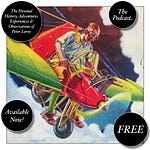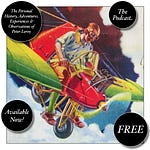13
“HEY, you made the right decision,” Porky told me. “You’re going to have a great time.” I had told him that I had invited Veronica to the skating party and that I didn’t know how to skate. I had not told him that the skating party was part of a plan to swap Veronica for a model airplane. Porky punched my shoulder in the good-natured way that men do when they’re going to start talking about sex. “Do you know what those roller-skating parties are like?” he asked me.
“No,” I admitted.
“Everybody meets at the high school,” he said. “You ride to the roller rink in a school bus, and everyone sings songs and tells jokes and has a wonderful time. In the back of the bus, they might do a little (he made the motions of puffing on a cigarette), a little (he made his hand into a fist and made the motion of drinking from his thumb), a little (he hugged himself and twisted from side to side). Then, at the rink, you skate and skate, and you take breaks for Cokes, and sometimes you walk out to the parking lot for some air, and a little (he made the motions of puffing on a cigarette), a little (he made his hand into a fist and made the motion of drinking from his thumb), a little (he hugged himself and twisted from side to side), and then you skate some more. You can have a hot dog or another Coke. Then everybody gets onto the bus again, and you ride back to the high school. This time, if the kids on the bus take care of the bus driver, he might take the long way home. You know,” said Porky, wearing an odd grin. “I’m going to be driving one of the buses to the roller rink and back. It might be arranged for me to take the long way home.”
I had a good idea what he meant. How? How did I know anything about taking the long way home? It was in the air. Just as a house, especially an old house, has an ambient odor that is only temporarily disturbed by a chowder simmering on the stove or a chicken roasting in the oven and soon returns to its more or less constant composition, of which we, the inhabitants of the house, are ordinarily unaware, noticing it only when we have been away for some time and return and inhale the comfortable odor of home, so a community, especially an old and established community, has an ambient Weltanschauung that may be temporarily disturbed by the arrival of outsiders or by the ideas in an influential book, but eventually returns to its more or less stable composition, of which we, the residents, may be unaware until we have been away and return and hear in a conversation the comforting ideas that were in the air around us when we were at home. One of the ideas in the air when I was a boy was the idea of taking the long way home. It was enough in the air so that I knew approximately what it was about.
I didn’t say anything in response to Porky’s suggestion. I just laughed. He winked and poked me in the side. I confided to him my fears that I might make a fool of myself when I tried to skate.
“Don’t worry about it, Peter,” said Porky. “It’s like anything else: if you convince yourself you can do it, you can do it.”
“You can?” I asked. I was young, but not so young that Porky’s statement didn’t strike me as preposterous. And yet, so strong within me was the irrational hope that he might somehow be right, that all it would take for me to turn in a creditable performance on roller skates was my convincing myself that I could do it, that I was poised for conversion, eager to believe Porky if he could provide even the flimsiest reason for my doing so.
“The thing to do,” Porky said, “is to imagine yourself doing what you’re going to try to do. You close your eyes and picture in your mind what you’re going to do. You picture every detail, from the first moment when your wheels hit the floor to the last spectacular spin and the applause of the crowd, and then when you really start to do it, when you glide onto the floor, you’ll feel as if you’ve already done all of this before, so it won’t be such a big deal anymore. You won’t be nervous at all. I do it all the time.”
I sat up straight. This was it. He was going to give me the evidence.
“Say I’m bowling, and I’ve left myself a tough split. I just take a few seconds to close my eyes and imagine myself making the split. I feel the ball in my hand. In my mind, I start my approach. I can feel the whole thing—my feet sliding toward the foul line, the release—and I can see the pins standing there, the ball rolling toward them, the hook, the way that it strikes the pin just right, the pin kicking across and striking the other. Then I’m ready. A calm spreads through me the way the smell of dinner spreads through a house. I’m ready. I think I can do it, so I can do it.”
It was a raw and drizzly afternoon. Porky and I were sitting in Bus Six, waiting for school to get out. Joy rushed through me. I believed Porky. I knew from the testimony of many people, including my father and Porky’s father, that Porky was a great bowler. If he had tried to convince me that this I-think-I-can technique had won him the love of beautiful women, I would have known that it didn’t work, but bowling was quite another story. It was easy for me to believe that it worked for bowling. And bowling, after all, was a lot like roller-skating.
Have you missed an episode or two or several?
You can begin reading at the beginning or you can catch up by visiting the archive or consulting the index to the Topical Guide.
You can listen to the episodes on the Personal History podcast. Begin at the beginning or scroll through the episodes to find what you’ve missed.
You can ensure that you never miss a future issue by getting a free subscription. (You can help support the work by choosing a paid subscription instead.)
At Apple Books you can download free eBooks of “My Mother Takes a Tumble,” “Do Clams Bite?,” “Life on the Bolotomy,” “The Static of the Spheres,” “The Fox and the Clam,” “The Girl with the White Fur Muff,” “Take the Long Way Home,” “Call Me Larry,” and “The Young Tars,” the nine novellas in Little Follies, and Little Follies itself, which will give you all the novellas in one handy package.
You’ll find an overview of the entire work in An Introduction to The Personal History, Adventures, Experiences & Observations of Peter Leroy. It’s a pdf document.















Share this post